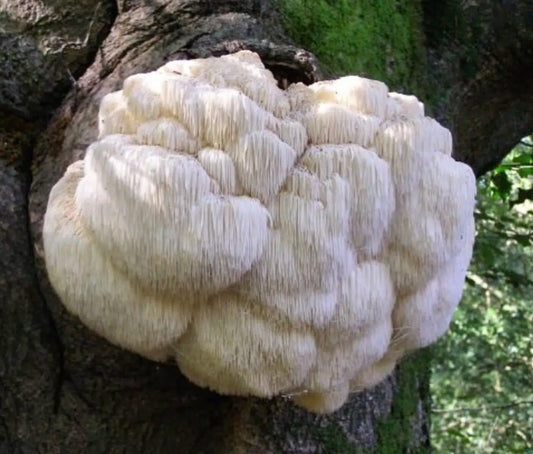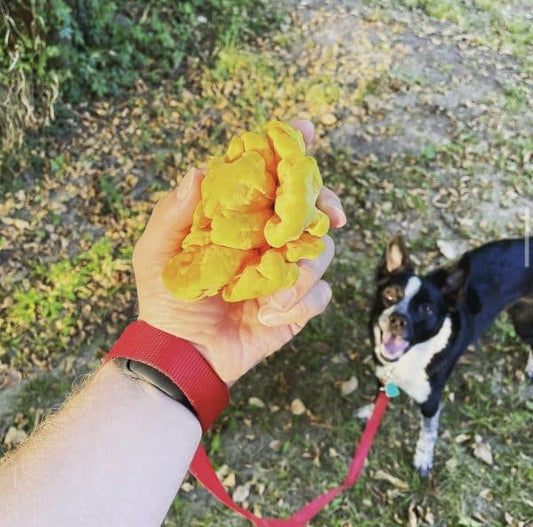Lion’s Mane mushrooms are extremely unique and one of the most desirable mushrooms available to humanity. Scientifically known as Hericium erinaceus, Lion’s Mane has been traditionally used in Chinese medicine and is now consumed worldwide. Lion’s Mane mushrooms have no toxic look-alikes, reducing the stigma associated with foraging for this specific fungi. Growing on dead or dying birch, beech, maple, and walnut trees in nature, home growers typically cultivate them on hardwood logs or sawdust.
The most notable 17 facts about Lion’s Mane mushrooms are mostly centered around the medicinal and nutritional benefits associated with them. Lion’s Mane is a rich source of antioxidants and polysaccharides, along with unique classes of compounds known as erinacines and hericenones, that are conducive to NGF synthesis and promote good health.
Lion’s Mane is a good source of protein, vitamins B, C, and even D, making them an excellent meat substitute. Lion’s Mane offers anti-inflammatory and immune-boosting properties while boosting cognitive function and memory, protecting the brain from age-related decline.
Lion’s Mane is one of the most commonly cultivated mushrooms, as it is relatively easy to grow, nutritious, and has impressive medicinal properties. Lion’s Mane mushrooms are typically consumed cooked or in supplement form, as they can be quite tough when raw. These mushrooms can be added to soups, stews, or stir-fries, or can be enjoyed on their own.
Facts About Lion's Mane Mushrooms
17. Lion's Mane Mushrooms Exhibit Anti-Cancer Properties
Lion’s Mane mushrooms have been shown to be effective against cancer. One study found that compounds in Lion’s Mane can help to kill cancer cells and prevent the spread of cancer, known as metastasis. For this reason, the authors of this study identified that Lion’s Mane mushrooms “have the potential to be a health-promoting functional food” back in 2013. (Kim et al., 2013) Additionally, Lion’s Mane can help to boost the immune system, stopping cancer before it can grow and spread, making it an ideal prophylactic agent. (Khan et al., 2013)
16. Lion's Mane Mushrooms Improve Immune System Function
Lion’s Mane mushrooms are a powerful tool for boosting the immune system. They contain compounds that can help fight off infection and disease-causing agents by enhancing B lymphocytes, T lymphocytes, interleukin-2, interleukin-4, and interferon secretion. (Wu et al., 2018) In addition, Lion’s Mane mushrooms have been shown to enhance the activity of macrophages, improving immune system function. (Ren et al., 2017)
15. Lion's Mane Mushrooms Exhibit Anti-Inflammatory Properties
Lion’s Mane mushrooms are an effective natural remedy for inflammation, as they are a rich source of antioxidants and anti-inflammatory compounds that can help to reduce inflammation throughout the body. Overall, Lion’s Mane has a moderate to high antioxidant content when compared to other mushrooms. (Abdullah, 2011)
There is a wide body of scientific evidence to support the anti-inflammatory effects of Lion’s Mane mushrooms. One study showed that Lion’s Mane mushrooms were able to reduce inflammation and oxidative stress in rats who suffered from a stroke. (Lee et al., 2014).
Antioxidants found in Lion’s Mane were also shown to protect the liver from alcohol-induced toxicity. (Hao et al., 2015) While drinking alcohol is likely not healthy in any quantity, if you are going to drink, consider consuming Lion’s Mane mushrooms before doing so to prime liver function.
Another study showed that erinacines found in Lion’s Mane mushrooms were effective at reducing inflammation and pain in rats with inflammatory bowel disease (Diling et al., 2017).
14. Lion's Mane Mushrooms Induces Nerve Growth Factor (NGF) Synthesis
Nerve Growth Factor (NGF) is a protein that promotes the growth and survival of neurons. Without adequate NGF, neural tissue will undergo apoptosis, meaning the cells will die. Both hericenones and erinacines that were isolated from Lion’s Mane have been shown to stimulate the growth of neural cells by mediating NGF synthesis. (Lai et al., 2013) In other words, Lion’s Mane can induce neural growth paramount to healthy cognition.
13. Lion's Mane Mushrooms Improve Memory
Lion’s Mane mushrooms are known to have memory-boosting effects by increasing NGF levels in the brain. One study found that Lion’s Mane mushrooms reduced memory loss commonly associated with Alzheimer’s disease. (Mori et al., 2011)
Another study found that Lion’s Mane mushroom supplements helped to improve cognitive function in people with mild cognitive impairment who were between the ages of 50 and 80 years old. The participants of the study took 250 mg tablets of Lion’s Mane extract three times a day or a placebo for four weeks. Those who took Lion’s Mane extract had significantly improved scores on tests of cognitive function. (Mori et al., 2009)
12. Lion's Mane Mushrooms Exhibit Antidepressant Effects
One of the most promising potential benefits of Lion’s Mane mushrooms is their antidepressant action. There are numerous studies on the benefits of consuming Lion’s Mane as a way to reduce depression and anxiety. The first study, published in 2010, demonstrated that consuming Lion’s Mane for four weeks reduced depression and anxiety significantly more than the placebo group. (Nagano et al., 2010)
The mechanism of action for how Lion’s Mane is able to facilitate its antidepressant effects has been determined in a study on rats. In short, antidepressant action is mediated through BDNF signaling. (Chiu et al., 2018) BDNF promotes neuroplasticity and treats depression at the core, specifically by neurogenesis, replacing atrophied neuronal structures. (Castrén & Monteggia, 2021) (Ryu et al., 2018)
Lion’s Mane, in combination with other BDNF-enhancing agents like psilocybin, has been shown to offer even more antidepressant potential. Popularized by Paul Stamets, microdosing psilocybin along with consuming Lion’s Mane and niacin work synergistically in promoting healthy brain function. In a study on treating Major Depressive Disorder (MDD) with psilocybin, 71% of participants received immediate relief and 54% of participants were still depression-free one month following the trial. (Davis et al., 2021)
Lion’s Mane Mushrooms and other BDNF-enhancing agents are promising natural treatments for depression and other mental health conditions that stem from neural atrophy.
11. Lion's Mane Mushrooms Improve Athletic Performance
Lion’s Mane mushrooms improve athletic performance. In one study on mice, it was shown that consuming Lion’s Mane increased muscular endurance and reduced muscular fatigue. (Komiya et al., 2019) This is why many endurance athletes consume Lion’s Mane before working out.
The reason why Lion’s Mane is able to stave off fatigue is that it increases both glycogen and antioxidant levels in the blood while reducing lactic acid levels. (Liu et al., 2015) Finally, Lion’s Mane improves recovery from workouts by reducing oxidative damage due to its high antioxidant content. (Kushairi et al., 2019)
10. Lion's Mane Mushrooms Offer Diabetic Nerve Pain Relief
One of the most well-known benefits of Lion’s Mane is its ability to relieve diabetic nerve pain in the extremities. In a study, regular consumption of Lion’s Mane over six weeks was shown to reduce nerve pain associated with diabetes. (Yi et al., 2015)
9. Lion's Mane Mushrooms Lowers Blood Sugar
Lion’s Mane mushrooms naturally lowers blood sugar. This medicinal mushroom has been used in China for centuries to help diabetics control their blood sugar levels. A study in diabetic rats demonstrated that Lion’s Mane reduced blood sugar levels over the course of four weeks. (Liang et al., 2013)

8. Lion's Mane Mushrooms Reduces The Probability Of Heart Disease
Lion’s Mane has been shown to reduce the probability of a heart attack or cardiovascular issues through multiple mechanisms of action. First, Lion’s Mane has been shown to reduce cholesterol levels, specifically LDL cholesterol and triglyceride levels, dramatically. (Choi et al., 2013) Additionally, Lion’s Mane was shown to reduce the oxidation of LDL cholesterol which has been associated with the development of atherosclerosis. (Rahman et al., 2014)
Lion’s Mane also reduces platelet aggregation, reducing the chance of thrombosis. (Mori et al., 2010) In other words, Lion’s Mane reduces the chance of developing a blood clot.
7. Lion's Mane Mushrooms Improve Gut Health
Lion’s Mane mushrooms are known to improve gut health by reducing inflammation. Lion’s Mane can improve digestion through its antibacterial action. Lion’s Mane has been shown to help treat stomach ulcers, as it is a strong antibiotic against H. pylori. (Lui et al., 2016)
6. Lion's Mane Mushrooms Improves Wound Healing
The ability of Lion’s Mane mushrooms to improve wound healing has been well documented in the medical literature. In a study, it was shown that an extract of Lion’s Mane can improve the healing of wounds by applying it topically, increasing the rate of wound healing and stimulating the growth of new tissue. (Abdulla et al., 2011)
5. Lion's Mane Mushrooms Are Hard To Find As They Grow High Up In Trees
While Lion’s Mane mushrooms can sometimes be found growing on the ground, they are most often found growing higher up on branches or tree trunks. So why do these mushrooms prefer to grow high up on trees? One theory is that these mushrooms need more sunlight than other types of mushrooms. Lion’s Mane mushrooms are also known to be fairly resistant to pests and diseases, so it’s possible that they are able to survive better in these higher locations.
4. Lion's Mane Mushrooms Are Typically Grown On Hardwood Logs Or Sawdust
To grow Lion’s Mane mushrooms all you need is a suitable log or hardwood sawdust, water, some spore inoculant, and a bit of patience. Most commercial growers use sawdust as the substrate because it is easier to work with, transport, and store.
3. Lion's Mane Mushrooms Are A Great Meat Or Seafood Substitute
Lion’s Mane mushrooms have a mild, slightly sweet flavor that has been described as similar to crab or lobster. When cooked, they become tender and can be used as a meat or seafood substitute in recipes. Lion’s Mane mushrooms are a great source of protein and other vitamins.
2. Lion's Mane Mushrooms Are High In Vitamin D
Lion’s Mane mushrooms are an excellent source of vitamin D. In fact, mushrooms are one of the only natural foods that contain vitamin D. (Cardwell et al., 2018) Vitamin D is important for supporting bone health and preventing osteoporosis. It also helps to boost the immune system and protect against various diseases.

1. Lion’s Mane Mushrooms Are Easy To Grow
Lion’s Mane mushrooms are one of the easiest fungi to grow. Typically start by soaking a hardwood log or sawdust in water for 24 hours. After 24 hours, drain the water and mix in a handful of spore inoculant. Then, place the log or sawdust in a shady spot outside and cover it with a tarp or piece of burlap. Check on the log or sawdust every few days to make sure it stays moist. If it starts to dry out, simply add more water.
After a few weeks, you should see white fuzzy growth beginning to appear on the surface of the wood. This is the Lion’s Mane mushroom mycelium. Once the mycelium has fully colonized the log or sawdust, it’s time to fruit the mushrooms. Water the log generously and keep it moist throughout the fruiting process. You should soon see mushrooms begin to emerge from the surface of the wood. Once the mushrooms are big enough to harvest, cut them at the base with a sharp knife.
Check out our Lion’s Mane Grow Kit that takes all the guesswork out of the process and makes it incredibly easy for you to have your first harvest of Lion’s Mane mushrooms.
17 Facts About Lion’s Mane Mushrooms
Lion’s Mane mushrooms have so many benefits which is why they are one of the most commonly grown mushrooms. So either grow your own mushrooms or buy them from us directly if you are located in the Kansas City area.
References
Kim, S. P., Nam, S. H., & Friedman, M. (2013). Hericium erinaceus (Lion’s Mane) mushroom extracts inhibit metastasis of cancer cells to the lung in CT-26 colon cancer-tansplanted mice. Journal of agricultural and food chemistry, 61(20), 4898–4904. https://doi.org/10.1021/jf400916c
Khan, M. A., Tania, M., Liu, R., & Rahman, M. M. (2013). Hericium erinaceus: an edible mushroom with medicinal values. Journal of complementary & integrative medicine, 10, /j/jcim.2013.10.issue-1/jcim-2013-0001/jcim-2013-0001.xml. https://doi.org/10.1515/jcim-2013-0001
Wu, F., , Zhou, C., , Zhou, D., , Ou, S., , Zhang, X., , & Huang, H., (2018). Structure characterization of a novel polysaccharide from Hericium erinaceus fruiting bodies and its immunomodulatory activities. Food & function, 9(1), 294–306. https://doi.org/10.1039/c7fo01389b
Ren, Z., Qin, T., Qiu, F., Song, Y., Lin, D., Ma, Y., Li, J., & Huang, Y. (2017). Immunomodulatory effects of hydroxyethylated Hericium erinaceus polysaccharide on macrophages RAW264.7. International journal of biological macromolecules, 105(Pt 1), 879–885. https://doi.org/10.1016/j.ijbiomac.2017.07.104
Abdullah, N. (2011, June 18). Evaluation of Selected Culinary-Medicinal Mushrooms for Antioxidant and ACE Inhibitory Activities. Https://Www.Hindawi.Com/Journals/Ecam/2012/464238/. https://www.hindawi.com/journals/ecam/2012/464238/
Lee, K. F., Chen, J. H., Teng, C. C., Shen, C. H., Hsieh, M. C., Lu, C. C., Lee, K. C., Lee, L. Y., Chen, W. P., Chen, C. C., Huang, W. S., & Kuo, H. C. (2014). Protective effects of Hericium erinaceus mycelium and its isolated erinacine A against ischemia-injury-induced neuronal cell death via the inhibition of iNOS/p38 MAPK and nitrotyrosine. International journal of molecular sciences, 15(9), 15073–15089. https://doi.org/10.3390/ijms150915073
Hao, L., Xie, Y., Wu, G., Cheng, A., Liu, X., Zheng, R., Huo, H., & Zhang, J. (2015). Protective Effect of Hericium erinaceus on Alcohol Induced Hepatotoxicity in Mice. Evidence-based complementary and alternative medicine : eCAM, 2015, 418023. https://doi.org/10.1155/2015/418023
Diling, C., Xin, Y., Chaoqun, Z., Jian, Y., Xiaocui, T., Jun, C., Ou, S., & Yizhen, X. (2017). Extracts from Hericium erinaceus relieve inflammatory bowel disease by regulating immunity and gut microbiota. Oncotarget, 8(49), 85838–85857. https://doi.org/10.18632/oncotarget.20689
Lai, P. L., Naidu, M., Sabaratnam, V., Wong, K. H., David, R. P., Kuppusamy, U. R., Abdullah, N., & Malek, S. N. (2013). Neurotrophic properties of the Lion’s Mane medicinal mushroom, Hericium erinaceus (Higher Basidiomycetes) from Malaysia. International journal of medicinal mushrooms, 15(6), 539–554. https://doi.org/10.1615/intjmedmushr.v15.i6.30
Mori, K., Obara, Y., Moriya, T., Inatomi, S., & Nakahata, N. (2011). Effects of Hericium erinaceus on amyloid β(25-35) peptide-induced learning and memory deficits in mice. Biomedical research (Tokyo, Japan), 32(1), 67–72. https://doi.org/10.2220/biomedres.32.67
Mori, K., Inatomi, S., Ouchi, K., Azumi, Y., & Tuchida, T. (2009). Improving effects of the mushroom Yamabushitake (Hericium erinaceus) on mild cognitive impairment: a double-blind placebo-controlled clinical trial. Phytotherapy research : PTR, 23(3), 367–372. https://doi.org/10.1002/ptr.2634
Nagano, M., Shimizu, K., Kondo, R., Hayashi, C., Sato, D., Kitagawa, K., & Ohnuki, K. (2010). Reduction of depression and anxiety by 4 weeks Hericium erinaceus intake. Biomedical research (Tokyo, Japan), 31(4), 231–237. https://doi.org/10.2220/biomedres.31.231
Chiu, C. H., Chyau, C. C., Chen, C. C., Lee, L. Y., Chen, W. P., Liu, J. L., Lin, W. H., & Mong, M. C. (2018). Erinacine A-Enriched Hericium erinaceus Mycelium Produces Antidepressant-Like Effects through Modulating BDNF/PI3K/Akt/GSK-3β Signaling in Mice. International journal of molecular sciences, 19(2), 341. https://doi.org/10.3390/ijms19020341
Castrén, E., & Monteggia, L. M. (2021). Brain-Derived Neurotrophic Factor Signaling in Depression and Antidepressant Action. Biological psychiatry, 90(2), 128–136. https://doi.org/10.1016/j.biopsych.2021.05.008
Ryu, S., Kim, H. G., Kim, J. Y., Kim, S. Y., & Cho, K. O. (2018). Hericium erinaceus Extract Reduces Anxiety and Depressive Behaviors by Promoting Hippocampal Neurogenesis in the Adult Mouse Brain. Journal of medicinal food, 21(2), 174–180. https://doi.org/10.1089/jmf.2017.4006
Davis AK, Barrett FS, May DG, et al. Effects of Psilocybin-Assisted Therapy on Major Depressive Disorder: A Randomized Clinical Trial. JAMA Psychiatry. 2021;78(5):481–489. doi:10.1001/jamapsychiatry.2020.3285
Komiya, Y., Nakamura, T., Ishii, M., Shimizu, K., Hiraki, E., Kawabata, F., Nakamura, M., Tatsumi, R., Ikeuchi, Y., & Mizunoya, W. (2019). Increase in muscle endurance in mice by dietary Yamabushitake mushroom (Hericium erinaceus) possibly via activation of PPARδ. Animal science journal = Nihon chikusan Gakkaiho, 90(6), 781–789. https://doi.org/10.1111/asj.13199
Liu, J., DU, C., Wang, Y., & Yu, Z. (2015). Anti-fatigue activities of polysaccharides extracted from Hericium erinaceus. Experimental and therapeutic medicine, 9(2), 483–487. https://doi.org/10.3892/etm.2014.2139
Kushairi, N., Phan, C. W., Sabaratnam, V., David, P., & Naidu, M. (2019). Lion’s Mane Mushroom, Hericium erinaceus (Bull.: Fr.) Pers. Suppresses H2O2-Induced Oxidative Damage and LPS-Induced Inflammation in HT22 Hippocampal Neurons and BV2 Microglia. Antioxidants (Basel, Switzerland), 8(8), 261. https://doi.org/10.3390/antiox8080261
Yi, Z., Shao-Long, Y., Ai-Hong, W., Zhi-Chun, S., Ya-Fen, Z., Ye-Ting, X., & Yu-Ling, H. (2015). Protective Effect of Ethanol Extracts of Hericium erinaceus on Alloxan-Induced Diabetic Neuropathic Pain in Rats. Evidence-based complementary and alternative medicine : eCAM, 2015, 595480. https://doi.org/10.1155/2015/595480
Liang, B., Guo, Z., Xie, F., & Zhao, A. (2013). Antihyperglycemic and antihyperlipidemic activities of aqueous extract of Hericium erinaceus in experimental diabetic rats. BMC complementary and alternative medicine, 13, 253. https://doi.org/10.1186/1472-6882-13-253
Choi, W. S., Kim, Y. S., Park, B. S., Kim, J. E., & Lee, S. E. (2013). Hypolipidaemic Effect of Hericium erinaceum Grown in Artemisia capillaris on Obese Rats. Mycobiology, 41(2), 94–99. https://doi.org/10.5941/MYCO.2013.41.2.94
Rahman, M. A., Abdullah, N., & Aminudin, N. (2014). Inhibitory effect on in vitro LDL oxidation and HMG Co-A reductase activity of the liquid-liquid partitioned fractions of Hericium erinaceus (Bull.) Persoon (Lion’s Mane mushroom). BioMed research international, 2014, 828149. https://doi.org/10.1155/2014/828149
Mori, K., Kikuchi, H., Obara, Y., Iwashita, M., Azumi, Y., Kinugasa, S., Inatomi, S., Oshima, Y., & Nakahata, N. (2010). Inhibitory effect of hericenone B from Hericium erinaceus on collagen-induced platelet aggregation. Phytomedicine : international journal of phytotherapy and phytopharmacology, 17(14), 1082–1085. https://doi.org/10.1016/j.phymed.2010.05.004
Liu, J. H., Li, L., Shang, X. D., Zhang, J. L., & Tan, Q. (2016). Anti-Helicobacter pylori activity of bioactive components isolated from Hericium erinaceus. Journal of ethnopharmacology, 183, 54–58. https://doi.org/10.1016/j.jep.2015.09.004
Abdulla, M. A., Fard, A. A., Sabaratnam, V., Wong, K. H., Kuppusamy, U. R., Abdullah, N., & Ismail, S. (2011). Potential activity of aqueous extract of culinary-medicinal Lion’s Mane mushroom, Hericium erinaceus (Bull.: Fr.) Pers. (Aphyllophoromycetideae) in accelerating wound healing in rats. International journal of medicinal mushrooms, 13(1), 33–39. https://doi.org/10.1615/intjmedmushr.v13.i1.50
Cardwell, G., Bornman, J. F., James, A. P., & Black, L. J. (2018). A Review of Mushrooms as a Potential Source of Dietary Vitamin D. Nutrients, 10(10), 1498. https://doi.org/10.3390/nu10101498



